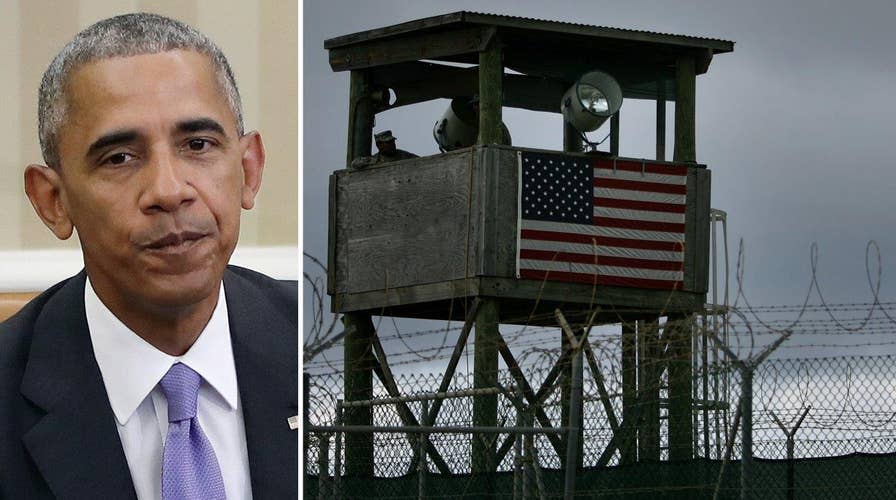'High risk' Guantanamo Bay detainees approved for transfer
On 'Special Report,' Catherine Herridge reports on the president's last-minute drive to close the prison
At least 19 troops stationed at the Guantanamo Bay military detention center were secretly returned to the US for severe “behavioral health reasons” between 2008 and 2011, according to an Army Institute of Public Health study.
In 2010, the Army began a one-year mental health survey after troops suffering stress conditions were evacuated. According to internal reports prepared in conjunction with that survey and obtained by VICE, of 1,422 troops and former guards interviewed, at least 300 – or roughly one in five – experienced either suicidal thoughts or other behavioral health conditions and were therefore deemed to be at “high [behavioral health] risk.”
Of the same interview pool, 565 troops developed behavioral health conditions and showed signs of post-traumatic stress (PTS) directly associated with their Guantanamo deployments, according to documents VICE obtained in response to a three-year-old Freedom of Information Act lawsuit.
The survey also found that 75 percent of troops who screened positive for behavioral health problems had no “pre-existing history of BH conditions.” Except for alcohol abuse, the rates of behavioral health conditions were similar to troops serving detention duty in Iraq.
According to the May 2011 Army report, the 19 troopers were “medically evacuated for behavioral health (BH) reasons” and that the “evacuation decision by Medical Treatment Facility (MTF) appears appropriate for these cases.”
Furthermore, reports of PTS at the Cuban facility were “twice as high as reported by a comparison population of Iraq detention camp Troopers.”
Foxnews.com received no immediate response to a request for comment from the Army Public Health Command and US Southern Command. The Southern Command, based at MacDill Air Force Base in Tampa, Fla., oversees the Cuban detention camp.
The Army did dispute assertions made in a 2013 “60 Minutes” report that troops at Guantanamo suffered from an increased rate of mental health conditions.
During the November 17 broadcast, Army Col. John Bogdan told anchor Lesley Stahl that “incidents of PTSD is almost twice that seen from regular aligned forces” as a consequence of serving on 12-hour shifts where they are exposed to “enemy contact” for 12 straight hours under continual threats of physical assault.
Bogdan’s claims were based on a misreading of a 2011 mental health survey that found guards were nearly twice as likely to test positive symptoms of PTSD as soldiers surveyed in previous studies, according to a statement issued by Col. Greg Julian, public affairs chief for the U.S. Southern Command.
“There are no statistics that support the claim of twice the number of troops diagnosed with PTSD,” contended Julian. “The survey revealed that these service members were nearly twice as likely (though not actually diagnosed) to screen positive for moderate to severe post-traumatic stress as soldiers surveyed in previous studies who had recently redeployed from Iraq or Afghanistan.”
In a separate VICE report that aired on HBO, two members of Task Force Platinum, the unit that guards terrorists like Khalid Sheikh Mohammed and 14 other former CIA captives, detailed the lasting impact of the constant threats they received from prisoners during regular 12-hour shifts at the detention center.
Andrew Turner, a Navy petty officer, described his time guarding “high-value” detainees as “99 percent boredom and then 1 percent of pure, unadulterated craziness” that included having urine and feces thrown at him and an endless barrage of verbal insults in multiple languages during shifts that could last up to 14 hours.
He said being called the insults and the abuse “kind of just tears people down and you just did not know what was coming around the corner.”
Nichole York spent nine months at Guantanamo Bay in 2009 and eventually received a formal diagnosis of PTS, which she attributed to abuse from prisoners.
The report did recommend better pre-deployment training for guards to prepare them for deployment to Gitmo and to identify any pre-existing mental health issues.
Capt. John Filostrat, a spokesman for the detention facility told VICE news he was unable to comment on whether the recommendations were implemented.
The Army survey determined that in addition to being inadequately prepared for deployments to Gitmo, troops often felt as if prisoners received better treatment than they did and often cited an “inability” to react to prisoner abuse.
The impact on troops on detainee detention duty was also addressed in a 2013 bipartisan report issued by The Constitution Project.
The Project’s Task Force on Detainee Treatment, which focused more on the negative consequences experienced by troops who engaged in “abuse,” cited several cases involving guards at Guantanamo, as well as at bases in Iraq and Afghanistan.
Fox example, Professor John Smith, a retired US Air Force captain, told members at a 2008 American Academy of Forensic Sciences annual meeting that guards, including one under his care, “are an overlooked group of victims.”
However, the task force noted that while studies examining the impact on prisoner guards during World War II exist, there is a “dearth” of analysis on guards serving in Iraq, Afghanistan or at Gitmo.
“There is abundant anecdotal evidence of psychological trauma affecting U.S. forces who engaged in abuse of detainees,” the report stated.













































